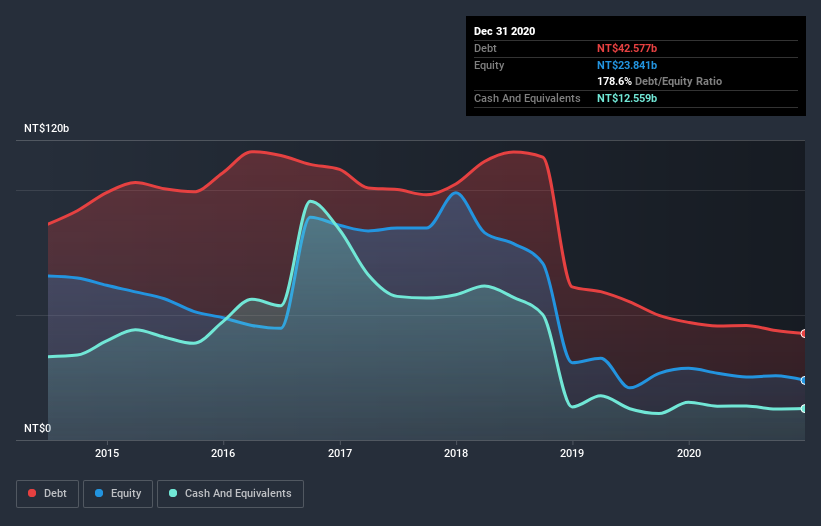
The external fund manager backed by Berkshire Hathaway's Charlie Munger, Li Lu, makes no bones about it when he says 'The biggest investment risk is not the volatility of prices, but whether you will suffer a permanent loss of capital.' So it seems the smart money knows that debt - which is usually involved in bankruptcies - is a very important factor, when you assess how risky a company is. As with many other companies Tatung Co., Ltd. (TPE:2371) makes use of debt. But the real question is whether this debt is making the company risky.
When Is Debt A Problem?
Generally speaking, debt only becomes a real problem when a company can't easily pay it off, either by raising capital or with its own cash flow. In the worst case scenario, a company can go bankrupt if it cannot pay its creditors. While that is not too common, we often do see indebted companies permanently diluting shareholders because lenders force them to raise capital at a distressed price. Of course, the upside of debt is that it often represents cheap capital, especially when it replaces dilution in a company with the ability to reinvest at high rates of return. The first thing to do when considering how much debt a business uses is to look at its cash and debt together.
View our latest analysis for Tatung
What Is Tatung's Debt?
The image below, which you can click on for greater detail, shows that Tatung had debt of NT$42.6b at the end of December 2020, a reduction from NT$47.1b over a year. However, it also had NT$12.6b in cash, and so its net debt is NT$30.0b.

How Healthy Is Tatung's Balance Sheet?
We can see from the most recent balance sheet that Tatung had liabilities of NT$51.0b falling due within a year, and liabilities of NT$35.7b due beyond that. Offsetting these obligations, it had cash of NT$12.6b as well as receivables valued at NT$6.23b due within 12 months. So its liabilities total NT$67.9b more than the combination of its cash and short-term receivables.
Given this deficit is actually higher than the company's market capitalization of NT$63.6b, we think shareholders really should watch Tatung's debt levels, like a parent watching their child ride a bike for the first time. In the scenario where the company had to clean up its balance sheet quickly, it seems likely shareholders would suffer extensive dilution. When analysing debt levels, the balance sheet is the obvious place to start. But it is Tatung's earnings that will influence how the balance sheet holds up in the future. So if you're keen to discover more about its earnings, it might be worth checking out this graph of its long term earnings trend.
Over 12 months, Tatung made a loss at the EBIT level, and saw its revenue drop to NT$32b, which is a fall of 11%. That's not what we would hope to see.
Caveat Emptor
Not only did Tatung's revenue slip over the last twelve months, but it also produced negative earnings before interest and tax (EBIT). To be specific the EBIT loss came in at NT$1.0b. When we look at that alongside the significant liabilities, we're not particularly confident about the company. It would need to improve its operations quickly for us to be interested in it. Not least because it had negative free cash flow of NT$66m over the last twelve months. So suffice it to say we consider the stock to be risky. For riskier companies like Tatung I always like to keep an eye on the long term profit and revenue trends. Fortunately, you can click to see our interactive graph of its profit, revenue, and operating cashflow.
If you're interested in investing in businesses that can grow profits without the burden of debt, then check out this free list of growing businesses that have net cash on the balance sheet.
If you’re looking to trade Tatung, open an account with the lowest-cost* platform trusted by professionals, Interactive Brokers. Their clients from over 200 countries and territories trade stocks, options, futures, forex, bonds and funds worldwide from a single integrated account. Promoted
Valuation is complex, but we're here to simplify it.
Discover if Tatung might be undervalued or overvalued with our detailed analysis, featuring fair value estimates, potential risks, dividends, insider trades, and its financial condition.
Access Free AnalysisThis article by Simply Wall St is general in nature. It does not constitute a recommendation to buy or sell any stock, and does not take account of your objectives, or your financial situation. We aim to bring you long-term focused analysis driven by fundamental data. Note that our analysis may not factor in the latest price-sensitive company announcements or qualitative material. Simply Wall St has no position in any stocks mentioned.
*Interactive Brokers Rated Lowest Cost Broker by StockBrokers.com Annual Online Review 2020
Have feedback on this article? Concerned about the content? Get in touch with us directly. Alternatively, email editorial-team (at) simplywallst.com.
About TWSE:2371
Tatung
Through its subsidiaries, provides energy saving and green energy related systems and services in Taiwan, rest of Asia, Europe, America, and internationally.
Excellent balance sheet with proven track record.
Similar Companies
Market Insights
Community Narratives



